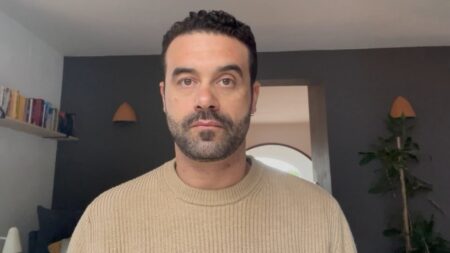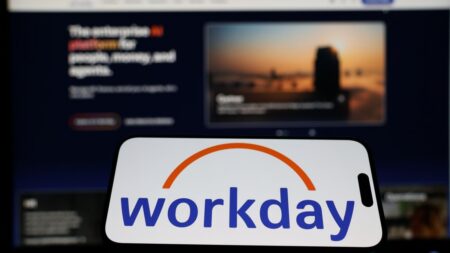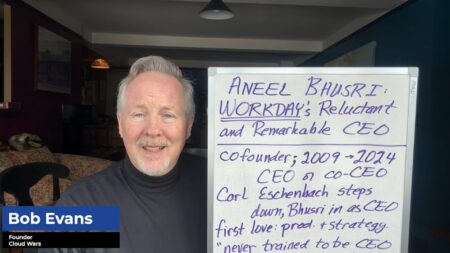
Eighteen months after raising the possibility that AI could turn out to be the greatest achievement in human history, Oracle chairman Larry Ellison has swept aside all doubt about AI’s pre-eminence as the grandest expression of human ingenuity and blows away other contenders such as electricity or the Industrial Revolution.
“About 18 months ago, when we began to fully grasp what the people at OpenAI and ChatGPT had achieved — a level of artificial intelligence that would actually advance human thinking with neural networks that could answer questions that human brains would struggle with — I made a speech in which I asked, ‘Is artificial intelligence the most important discovery in the history of humankind? Maybe. And we’ll soon find out,’ ” Ellison said at the recent World Governments Summit.
“Today, 18 months later, I think it’s very, very clear: AI is a much bigger deal than the Industrial Revolution, electricity, and everything that’s come before,” Ellison said in a video conversation with former UK prime Minister Tony Blair.
“We will soon have not only artificial intelligence but also — much sooner than anticipated —artificial general intelligence and then, in the not-too-distant future, artificial superintelligence.”
Now, I fully realize that this is just one person’s opinion. But in this case, that one person happens to be one of the world’s leading achievers, thinkers, and visionaries, and someone who has compounded that ability to see over the horizon with a 50-year track record of consistently turning his dreams into wildly successful outcomes.
So any business executive who’s still undecided about whether AI is simply the latest ultra-luminescent high-tech shiny object that’ll be largely forgotten in a year or two might very well want to reconsider that do-nothing stance.
And Ellison’s second big message was also utterly unequivocal: The road to AI nirvana is paved with large quantities of high-quality and fully accessible data.
Here’s my favorite excerpt from Ellison’s video interview because here Ellison provides the evidence for his whole-hearted belief that AI solutions will — more than any innovation in human history — transform and improve life for billions of people around the world :
“We will have incredible reasoning power, the ability to discover things that would elude the human mind because this next generation of AI is going to reason so much faster and discover insights so much faster, whether it’s being able to diagnose cancer in early stages or design therapies, custom-design vaccines for those cancers that are custom-made for your genomics and your specific tumor antigens. So in medicine, we’ll see revolutions in diagnostics and in therapeutics.
“We’ve started a project where we’re gathering satellite imagery from Kenya to California. And we can predict crop yields — so we could actually tell a farmer or an entire country whether they’re going to exceed what they expect from this year’s harvest or they’re going to have a shortfall and need to start preparing for that. We can tell individual farmers that a part of their field needs more irrigation, or part of their field needs additional fertilizer. So we can improve yields on an individual farm, and also on a much larger scale where we can improve yields across countries and even across entire regions of the world.
“I can go on and on, but AI will fundamentally change our lives in medicine, agriculture, and robotics across the board.”
But to turn all that extraordinary potential into reality, Ellison said, people must recognize the essential role of data, which Ellison referred to as “the missing link.”
Currently, Ellison said, the world’s data is “fragmented — it’s not easily accessible by these AI models. We have to take all of this data we have in our countries and move it into a single, if you will, ‘unified data platform’ so that when we want to ask a question, we’ve provided that AI model with all the data it needs to understand our country.

AI Agent & Copilot Summit is an AI-first event to define opportunities, impact, and outcomes with Microsoft Copilot and agents. Building on its 2025 success, the 2026 event takes place March 17-19 in San Diego. Get more details.
“That’s the big step — that’s the missing link — we need to unify all of the national data, put it into a database where it’s easily consumable by the AI model, and then ask whatever question you like,” Ellison said.
“The secret is to get all that data in one place. Without having the basic data, the AI model doesn’t have the context and cannot answer the [specific] questions about your country.”
Ellison offered two broad examples of where this unification of data can enable AI to drive unprecedented innovation and advances: healthcare and agriculture.
“We will have incredible reasoning power, the ability to discover things that would elude the human mind because this next generation of AI is going to reason so much faster and discover insights so much faster, whether it’s being able to diagnose cancer in early stages or design therapies, custom-design vaccines for those cancers that are custom-made for your genomics and your specific tumor antigens. So in medicine, we’ll see revolutions in diagnostics and in therapeutics,” Ellison said.
Turning to the potential for farmers to use AI to dramatically boost yields, Ellison described the power of blending high-level data with country-specific and even farm-specific data.
“We’ve started a project where we’re gathering satellite imagery from Kenya to California,” he said.
“And with it we can predict crop yields — so we could actually tell a farmer or an entire country whether they’re going to exceed what they expect from this year’s harvest, or if they’re going to have a shortfall and need to start preparing for that. We can tell individual farmers that a part of their field needs more irrigation, or part of their field needs additional fertilizer. So we can improve yields on an individual farm, and also on a much larger scale where we can improve yields across countries and even across entire regions of the world.”
That’s a pretty big dream to dream: boosting food production not only for individual farms or even for specific countries, but indeed across entire regions of the globe — entire continents! That’s a scale of achievement that truly reveals the promise that Ellison believes AI holds.
And the path forward, he said, moving beyond the original large language models that stunned the world a couple of years ago to providing smaller and purpose-built models that provide new and high-value insights into countries or parts of countries.
“Everybody talks about the big AI models and they are astonishing, but how do you provide a context? Such as, ‘I want to ask a question about my country. What’s going on in my country? What’s happening with my farmers? I need to give it my climate data!’,” Ellison said
“Well, the model probably has your climate data already. But you need to know exactly what crops are growing on which farms to predict the output. So I have to take those satellite images from my country and feed that into a database that is accessible by the AI model. And I have to tell the AI model as much about my country as I can. You tell part of the story with these satellite images —they give you a huge amount of information — and then you add to that by telling the model where roads are, where borders are, where utilities are.”
Final Thought
That approach — from the very large to the very small — seems perfectly obvious to us today, but that great clarity was certainly not the case a couple of years ago when OpenAI’s ChatGPT was released and shocked the world. (As Ellison so elegantly described it, “The newborn baby talked.”)
In the seminal 1962 masterpiece The Structure of Scientific Revolutions, Thomas Kuhn describes the foundational changes that disrupt how we view the world around us, and the processes by which those new visions arise. Writing as he did more than 60 years ago, Kuhn says these upheavals can take decades to come to fruition as various traditions and institutions and dogmas must be confronted, challenged, and overcome.
But today, rather than durations of many years or even decades, we’re seeing such revolutions take mere months. And when a dreamer and achiever of Larry Ellison’s stature can be convinced in just 18 months that the greatest achievement in human history is at hand, I would suggest we all ask ourselves if this is a revolution that we’re going to choose to sit out.
And I hope we all answer, “Hell, no.”
Ask Cloud Wars AI Agent about this analysis










